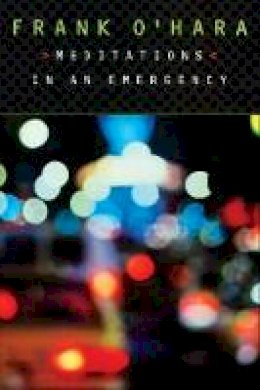6%OFF

Stock image for illustration purposes only - book cover, edition or condition may vary.
Meditations in an Emergency
Frank O´hara
€ 16.99
€ 16.00
FREE Delivery in Ireland
Description for Meditations in an Emergency
Paperback. Num Pages: 52 pages. BIC Classification: 1KBB; 2AB; DC; DSBH. Category: (G) General (US: Trade); (UU) Undergraduate. Dimension: 203 x 138 x 7. Weight in Grams: 108.
Frank O'Hara was one of the great poets of the twentieth century and, along with such widely acclaimed writers as Denise Levertov, Allen Ginsberg, Robert Creeley, and Gary Snyder, a crucial contributor to what Donald Allen termed the New American Poetry, which, by its vitality alone, became the dominant force in the American poetic tradition. Frank O'Hara was born in Baltimore in 1926 and grew up in New England; from 1951 he lived and worked in New York, both for Art News and for the Museum of Modern Art, where he was an associate curator. O'Hara's untimely death in 1966 at the age of forty was, in the words of fellow poet John Ashbery, the biggest secret loss to American poetry since John Wheelwright was killed. This collection is a reissue of a volume first published by Grove Press in 1957, and it demonstrates beautifully the flawless rhythm underlying O'Hara's conviction that to write poetry, indeed to live, you just go on your nerve.
Product Details
Publisher
Black Cat
Number of pages
52
Format
Paperback
Publication date
1996
Condition
New
Weight
108g
Number of Pages
52
Place of Publication
New York, United States
ISBN
9780802134523
SKU
V9780802134523
Shipping Time
Usually ships in 15 to 20 working days
Ref
99-15
Reviews for Meditations in an Emergency
O'Hara, a key interpreter of the aesthetics of abstract-expressionism, was a vital presence in New York's dynamic postwar art world, whether as a curator at the Museum of Modem Art, a visionary critic, a lushly original and lyrical poet, or an unflagging, often outrageous socialite. Donna Seaman, Booklist Moving in the way that only simple communication can be moving. . . . His poems always manage a fresh start, free from the dreadful posturings of the conventional verse of his generation. Kenneth Rexroth, The New York Times Book Review
